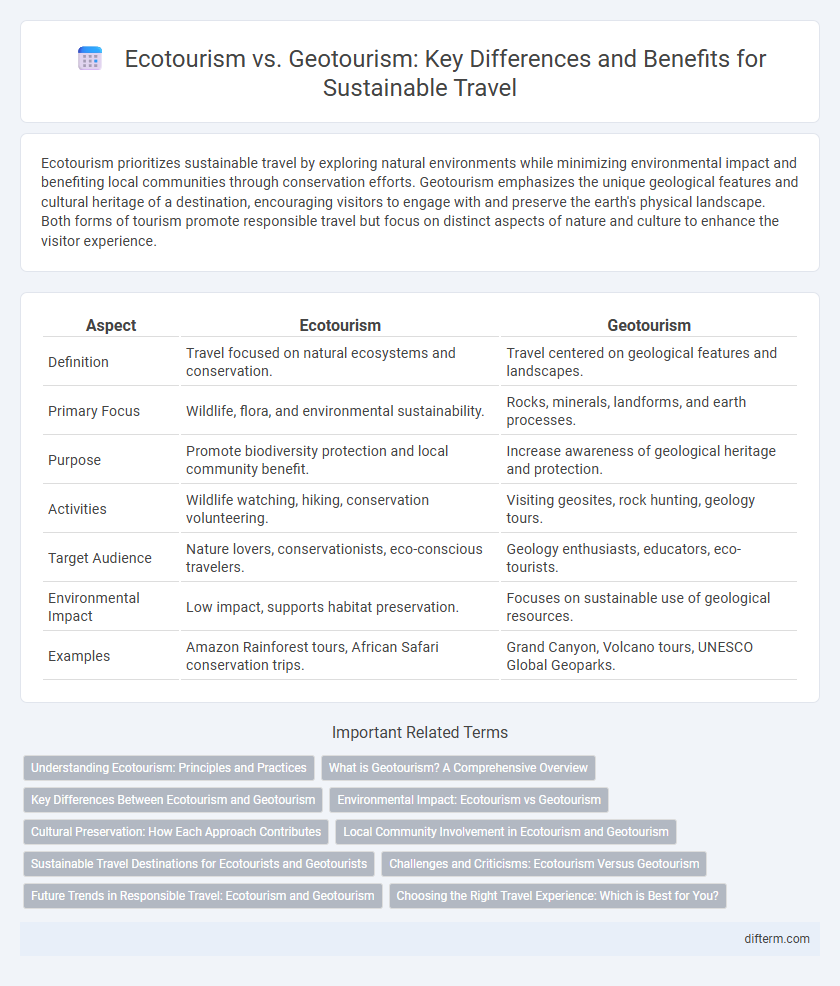Ecotourism prioritizes sustainable travel by exploring natural environments while minimizing environmental impact and benefiting local communities through conservation efforts. Geotourism emphasizes the unique geological features and cultural heritage of a destination, encouraging visitors to engage with and preserve the earth's physical landscape. Both forms of tourism promote responsible travel but focus on distinct aspects of nature and culture to enhance the visitor experience.
Table of Comparison
| Aspect | Ecotourism | Geotourism |
|---|---|---|
| Definition | Travel focused on natural ecosystems and conservation. | Travel centered on geological features and landscapes. |
| Primary Focus | Wildlife, flora, and environmental sustainability. | Rocks, minerals, landforms, and earth processes. |
| Purpose | Promote biodiversity protection and local community benefit. | Increase awareness of geological heritage and protection. |
| Activities | Wildlife watching, hiking, conservation volunteering. | Visiting geosites, rock hunting, geology tours. |
| Target Audience | Nature lovers, conservationists, eco-conscious travelers. | Geology enthusiasts, educators, eco-tourists. |
| Environmental Impact | Low impact, supports habitat preservation. | Focuses on sustainable use of geological resources. |
| Examples | Amazon Rainforest tours, African Safari conservation trips. | Grand Canyon, Volcano tours, UNESCO Global Geoparks. |
Understanding Ecotourism: Principles and Practices
Ecotourism emphasizes responsible travel to natural areas that conserves the environment and improves the well-being of local people, promoting sustainability and minimal impact. Key principles include environmental education, respect for local cultures, and active participation in conservation efforts, ensuring that tourism supports biodiversity and natural heritage. Practices often involve guided nature tours, wildlife observation, and support for community-based conservation projects that foster ecological awareness and sustainable development.
What is Geotourism? A Comprehensive Overview
Geotourism focuses on experiencing and preserving the Earth's geological features, landscapes, and cultural heritage, promoting sustainability and education about natural history. Unlike ecotourism, which centers on biodiversity and ecosystems, geotourism emphasizes unique rock formations, fossils, and geological processes that shape the environment. This form of tourism supports local communities by encouraging responsible exploration of geological sites while enhancing awareness of Earth's dynamic systems.
Key Differences Between Ecotourism and Geotourism
Ecotourism emphasizes conservation, environmental education, and minimal impact on natural habitats, primarily promoting sustainable travel to fragile ecosystems. Geotourism focuses on preserving the geological heritage and cultural identity of a destination, highlighting unique landforms, rock formations, and local traditions. Both forms advocate responsible tourism, but ecotourism centers on ecological preservation, while geotourism integrates geological conservation with cultural appreciation.
Environmental Impact: Ecotourism vs Geotourism
Ecotourism emphasizes conservation, promoting minimal environmental impact through responsible travel to natural areas, supporting biodiversity preservation, and local communities. Geotourism focuses on sustaining the geographic character of a place, including its environment, culture, and heritage, by encouraging tourists to engage with geological features responsibly. Both approaches aim to reduce ecological footprints, but ecotourism prioritizes ecosystem protection while geotourism integrates environmental stewardship with cultural and geological awareness.
Cultural Preservation: How Each Approach Contributes
Ecotourism promotes cultural preservation by encouraging respect for indigenous traditions and supporting local economies through environmentally responsible travel practices. Geotourism emphasizes safeguarding geological heritage alongside cultural sites, fostering community involvement in preserving both natural landscapes and historical narratives. Both approaches contribute to cultural preservation by educating travelers and empowering local populations to maintain their heritage sustainably.
Local Community Involvement in Ecotourism and Geotourism
Local community involvement in ecotourism emphasizes sustainable practices that preserve natural resources while providing economic benefits through guided tours and conservation efforts. In geotourism, communities actively promote the protection of geological sites and cultural heritage, encouraging educational experiences that foster pride and environmental stewardship. Both tourism types rely on empowering locals to manage tourism impacts and support authentic visitor engagement.
Sustainable Travel Destinations for Ecotourists and Geotourists
Ecotourism emphasizes traveling to natural areas that conserve the environment and improve the well-being of local communities, focusing on biodiversity hotspots such as Costa Rica's rainforests and the Galapagos Islands. Geotourism, centered on geological features and landscapes, promotes sustainable visits to destinations like Iceland's volcanic terrains and the Grand Canyon, where preserving earth heritage is paramount. Both travel styles prioritize sustainable development goals, minimizing carbon footprints while supporting local economies and fostering environmental stewardship.
Challenges and Criticisms: Ecotourism Versus Geotourism
Ecotourism faces challenges such as habitat disturbance, cultural commodification, and greenwashing, with critics arguing that it sometimes prioritizes profit over true conservation. Geotourism emphasizes preserving geological features and local culture but struggles with balancing visitor impact and maintaining authenticity in rapidly developing areas. Both forms encounter difficulties in ensuring community involvement and equitable benefit distribution while mitigating environmental degradation.
Future Trends in Responsible Travel: Ecotourism and Geotourism
Future trends in responsible travel emphasize the integration of ecotourism and geotourism principles to promote sustainable interaction with natural and geological environments. Advancements in eco-friendly technologies and immersive educational experiences are enhancing traveler awareness and minimizing ecological footprints. Increasing demand for authentic, conservation-focused journeys drives innovation in community-based tourism models supporting both biodiversity preservation and geological heritage protection.
Choosing the Right Travel Experience: Which is Best for You?
Ecotourism emphasizes sustainable travel focused on preserving natural environments and supporting local communities, ideal for travelers seeking wildlife encounters and conservation education. Geotourism highlights exploring geological features and landscapes, appealing to those interested in earth sciences, unique landforms, and cultural heritage connected to geology. Choosing between ecotourism and geotourism depends on your interest in biodiversity and conservation or geological exploration and cultural appreciation.
Ecotourism vs Geotourism Infographic

 difterm.com
difterm.com